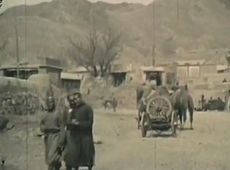John Van Antwerp MacMurray
John Van Antwerp MacMurray (October 6, 1881 – September 25, 1960) was an American attorney, author and diplomat best known as one of the leading China experts in the U.S. government.
Although MacMurray had coveted the China post, he soon fell into disagreement with the State Department over U.S. policy towards the ruling the Nationalist government.
Later, while he was attending the nearby Lawrenceville School, his father's death dealt a "deep emotional blow", according to historian Arthur Waldron.
[3] In 1903, MacMurray was admitted to the Columbia University Law School, and gained admission to the New York State Bar Association in 1906.
There he worked under ambassador William Woodville Rockhill, who was credited with helping to shape the United States' open door policy towards China.
MacMurray was well regarded within the diplomatic community in Peking; Sir Ronald Macleay with the British delegation described him as friendly and agreeable, and relatively unburdened by the preconceived ideas and sentimentality towards China that afflicted several of his predecessors.
[8] Another British diplomat, Sir Miles W. Lampson, recorded MacMurray's complaints that Washington allowed him little initiative, and seldom adopted his proposals.
[8] Soon after arriving in China, MacMurray fell into disagreement with Washington over U.S. policy towards the ruling Kuomintang (Nationalist) government, which had been demanding immediate revisions to or a cessation of the treaty system in place between the two countries.
"The issue of success or failure for the policies evolved at the Washington Conference was actually in the hands of China herself, of Great Britain, and of the United States.
"[15] According to Arthur Waldron, MacMurray found that China in particular "systematically flouted the legal framework that alone guaranteed her international position, and by so doing invited Japan's wrath."
It would merely create a new set of stresses, and substitute for Japan the USSR as the successor of Imperial Russia as a contestant (and at least an equally unscrupulous and dangerous one) for mastery of the East.
Throughout his diplomatic tours in China, MacMurray captured thousands of photographs and recorded hours of footage of everyday life.
MacMurray, along with his wife and sister, had traveled to Kalgan and Changpeh with Roy Chapman Andrews, an American explorer and naturalist who made multiple expeditions to the Gobi Desert.
To secure passage between Kalgan and Changpeh, MacMurray enlisted the aid of local warlord Zhang Zuolin, who provided an escort of 50 cavalry, 8 cars, and 150 camels.
[19][20] In 1916, MacMurray married Lois R. Goodnow, the daughter of Frank Johnson Goodnow—a legal scholar, president of Johns Hopkins University, and a former advisor to the government of the Republic of China.

